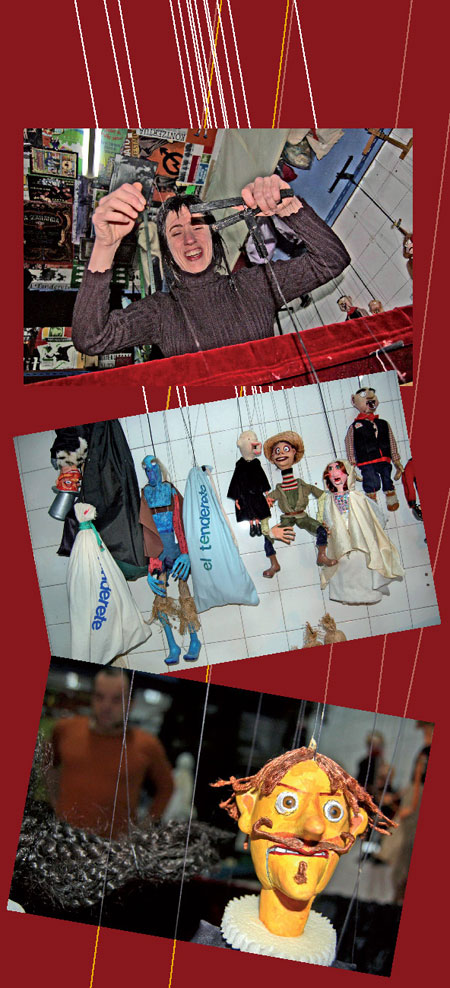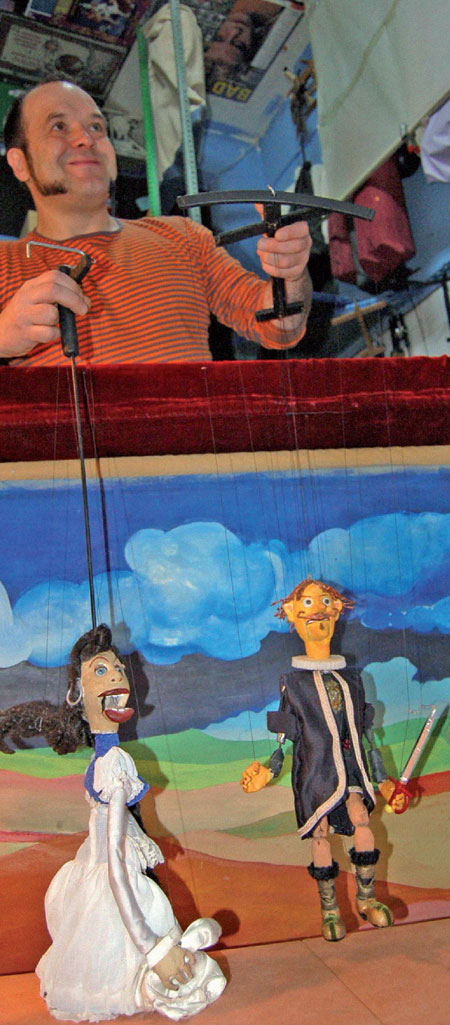el tenderete·held by a thread, giving life myriam garzia
I itziar diaz de durana We've gone into a little theatre, but we suddenly realise that the actors in this theatre aren't usual ones. They're Lito and Manya, giving life to the dolls from El Tenderete marionette group by a thread. We spoke with them. They've spent 16 years making dolls and making them come alive at the same time as studying and enrichening this type of theatre.
You've often mentioned the gap there is in marionette theatre with regards to investigation as it's always had popular origins. Is it difficult to always make things up as you go along?
Manya (M): I wanted to prepare a doctorate about marionette theatre, but there's hardly any bibliography about it, so I had to give up. People think that usual theatre norms are applicable to marionette theatre, but it's not true. Marionette theatre has its own characteristics too, though they're often not written ones. There are some writer who have written for marionette theatre, for example Valle-Inclan, Lorca and Blancoamor. We've learnt the job by reading what little there is written.
Lito (L): You can also learn by listening to the old marionette makers, that's going back to the roots. There are special voices in the marionette world and you have to listen to them.
You've spent 16 years in this little theatre world, ever since Bilboko Gaztetxea was closed, where you took part in a marionette group. How do you take on so many years' experience?
(M): You learn from one project to the next, they're always different, they change place and time from one work to another. We work in the street, in open spaces. Theatres are often closed spaces in which the spectators only have to applaud at the end. And if they throw something at you, it's a huge laugh. The spectators too are in charge in our plays, and at the end of the day it's they who say what works and what doesn't. You're always learning thanks to the freedom and spontaneity that the marionettes give you.
For grown-ups as well as for children?
(M): Marionette theatre works for everyone. Categorisation is a commercial characteristic of today's theatre. Marionette theatre has always been there from the whole family, it's always been done in bars and in squares for the general public. So why not have marionettes for grown-ups?
(L): Perhaps because marionette theatre has been mixed up with teachers, maybe that's why marionette theatre has been linked with children. Marionette theatre has to be fun and open, it can't be an exclusively educational experience. It's hard to make a choice. At the end of the day, you do the job you want to, but you never get close to your objectives. You get tired and worn out and there's no time to think about other things.
(M): That educational side takes a lot away from marionettes. More than anything else, because marionettes have always been something else, they can do impossible things. We think that attitude impoverishes marionette theatre and we have to take that into account as it's how we earn a living.
Along with more personal projects such as "Los amores y desamores de la Molinera" or "El Buen Oficio del Maleficio".
(M): It's aimed at our generation, mentioning the things we have around us, and there are second meanings. We refer to Valle-Inclan and a lot of bad things: envy, ambition and arrogance, the manipulation of power ... all this is shown in the characters.
Are marionettes based on reality?
(M): Marionettes are in our world too, they suffer like us and get hurt by the same things. Our marionettes are like that and we take them to extremes in our latest work, when there's envy there's a lot of envy ... There's surrealism and satire in La Molinera.
There are two well-known characters in your works, how long have Puño and Letra been around?
(M): They've been with us from the start.
You're members of the Basque Country's UNIMA marionette association. What type of relationships are there in the association?
(M): There's a bit of everything and there are great contrasts between us.
(L): All types of marionette groups come together in the association and that's good, but what's the real link between a typical small marionette group and a company which produces artistic work? It's hard to bring everyone together. It's impossible to put limits to the puppet-master's job. Nowadays we know what our work is and we know what we'll never do.
(M): There's a sort of dependency because we're professionals and it's our way of living, that's inevitable. But I think we work well on both levels, and we also know how to say no to things we don't want to do.
You've often mentioned the gap there is in marionette theatre with regards to investigation as it's always had popular origins. Is it difficult to always make things up as you go along?
Manya (M): I wanted to prepare a doctorate about marionette theatre, but there's hardly any bibliography about it, so I had to give up. People think that usual theatre norms are applicable to marionette theatre, but it's not true. Marionette theatre has its own characteristics too, though they're often not written ones. There are some writer who have written for marionette theatre, for example Valle-Inclan, Lorca and Blancoamor. We've learnt the job by reading what little there is written.
Lito (L): You can also learn by listening to the old marionette makers, that's going back to the roots. There are special voices in the marionette world and you have to listen to them.
You've spent 16 years in this little theatre world, ever since Bilboko Gaztetxea was closed, where you took part in a marionette group. How do you take on so many years' experience?
(M): You learn from one project to the next, they're always different, they change place and time from one work to another. We work in the street, in open spaces. Theatres are often closed spaces in which the spectators only have to applaud at the end. And if they throw something at you, it's a huge laugh. The spectators too are in charge in our plays, and at the end of the day it's they who say what works and what doesn't. You're always learning thanks to the freedom and spontaneity that the marionettes give you.
For grown-ups as well as for children?
(M): Marionette theatre works for everyone. Categorisation is a commercial characteristic of today's theatre. Marionette theatre has always been there from the whole family, it's always been done in bars and in squares for the general public. So why not have marionettes for grown-ups?
(L): Perhaps because marionette theatre has been mixed up with teachers, maybe that's why marionette theatre has been linked with children. Marionette theatre has to be fun and open, it can't be an exclusively educational experience. It's hard to make a choice. At the end of the day, you do the job you want to, but you never get close to your objectives. You get tired and worn out and there's no time to think about other things.
(M): That educational side takes a lot away from marionettes. More than anything else, because marionettes have always been something else, they can do impossible things. We think that attitude impoverishes marionette theatre and we have to take that into account as it's how we earn a living.
Along with more personal projects such as "Los amores y desamores de la Molinera" or "El Buen Oficio del Maleficio".
(M): It's aimed at our generation, mentioning the things we have around us, and there are second meanings. We refer to Valle-Inclan and a lot of bad things: envy, ambition and arrogance, the manipulation of power ... all this is shown in the characters.
Are marionettes based on reality?
(M): Marionettes are in our world too, they suffer like us and get hurt by the same things. Our marionettes are like that and we take them to extremes in our latest work, when there's envy there's a lot of envy ... There's surrealism and satire in La Molinera.
There are two well-known characters in your works, how long have Puño and Letra been around?
(M): They've been with us from the start.
You're members of the Basque Country's UNIMA marionette association. What type of relationships are there in the association?
(M): There's a bit of everything and there are great contrasts between us.
(L): All types of marionette groups come together in the association and that's good, but what's the real link between a typical small marionette group and a company which produces artistic work? It's hard to bring everyone together. It's impossible to put limits to the puppet-master's job. Nowadays we know what our work is and we know what we'll never do.
(M): There's a sort of dependency because we're professionals and it's our way of living, that's inevitable. But I think we work well on both levels, and we also know how to say no to things we don't want to do.




